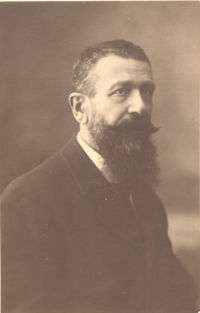Cesare Burali-Forti
Cesare Burali-Forti (13 August 1861 – 21 January 1931) was an Italian mathematician, after whom the Burali-Forti paradox is named.
Cesare Burali-Forti | |
|---|---|
 | |
| Born | 13 August 1861 |
| Died | 21 January 1931 |
| Known for | Burali-Forti paradox |
| Scientific career | |
| Fields | Mathematics |
Biography
Burali-Forti was born in Arezzo, and was an assistant of Giuseppe Peano in Turin from 1894 to 1896, during which time he discovered a theorem which Bertrand Russell later realised contradicted a previously proved result by Georg Cantor. The contradiction came to be called the Burali-Forti paradox of Cantorian set theory. He died in Turin.
Books by C. Burali-Forti
- Analyse vectorielle générale: Applications à la mécanique et à la physique. with Roberto Marcolongo (Mattéi & co., Pavia, 1913).
- Corso di geometria analitico-proiettiva per gli allievi della R. Accademia Militare (G. B. Petrini di G. Gallizio, Torino, 1912).
- Geometria descrittiva (S. Lattes & c., Torino, 1921).
- Introduction à la géométrie différentielle, suivant la méthode de H. Grassmann (Gauthier-Villars, 1897).
- Lezioni Di Geometria Metrico-Proiettiva (Fratelli Bocca, Torino, 1904).
- Meccanica razionale with Tommaso Boggio (S. Lattes & c., Torino, 1921).
- Logica Matematica (Hoepli, Milano, 1894.
- Complete listing of publications and bibliography, 8 pages.
Bibliography
Primary literature in English translation:
- Jean van Heijenoort, 1967. A Source Book in Mathematical Logic, 1879-1931. Harvard Univ. Press.
- 1897. "A question on transfinite numbers," 104-11.
- 1897. "On well-ordered classes," 111-12.
Secondary literature:
- Ivor Grattan-Guinness, 2000. The Search for Mathematical Roots 1870-1940. Princeton Uni. Press.
gollark: Obviously you negotiate forward error correction and stream compression options before exchanging high bitrate data.
gollark: Screech 56k modem sounds at your conversation partner?
gollark: Well, I guess you could link to that, yes.
gollark: <@160279332454006795> What if dictionary explaining apioforms and such on hpage™?
gollark: Given the temporal omnipresence of apioforms I *guess* they could be considered nostalgic, at least?
References
- O'Connor, John J.; Robertson, Edmund F., "Cesare Burali-Forti", MacTutor History of Mathematics archive, University of St Andrews.
External links
- Works by or about Cesare Burali-Forti at Internet Archive
- "Introduction to Differential Geometry, following the method of H. Grassmann" (English translation)
This article is issued from Wikipedia. The text is licensed under Creative Commons - Attribution - Sharealike. Additional terms may apply for the media files.